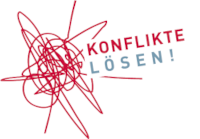Annual Theme 2025|26 "Resolving Conflicts!"

The 2025|26 annual theme explores how conflict can be resolved.
Conflicts affect all areas of our lives, from the family to the global political situation. The question of whether and how conflicts can be resolved arises at every historical juncture. Conflict resolution strategies are not only diverse and flexible. Conflict also is essential to scientific practices. The sciences and humanities thrive on debate, and they enter into conversation with the public to reflect on various kinds of conflict. In this way, they aim to contribute to resolving them.
Over the next couple of years, the annual theme will organize different scientific, artistic, and literary events to examine the potentials of conflict resolution in both science and society, opening up an ensemble of questions including: Which forms and practices exist historically for the resolution of conflicts? How were different media used to productively reflect on conflict situations? How have personalities from different areas experienced, managed, and implemented strategies of conflict resolution? What kinds of conflict resolution strategies are needed to tackle global problems such as food justice? What role do social media play in the negotiation of conflicts in the public sphere? Do terms such as identity or freedom carry conflictual potential and how should we discuss this? How does AI influence the resolution of conflicts? How can the sciences and humanities contribute to solving conflict issues such as climate change?

